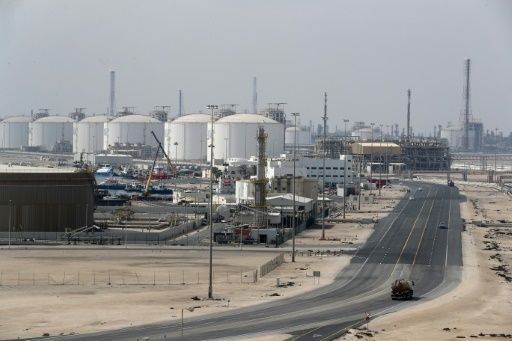Kuwait City
A Saudi-led diplomatic and economic blockade against Qatar may threaten food imports, but the tiny emirate still has a lifeline through its gas and oil exports, experts said on Tuesday (Jun 6).
Saudi Arabia, the UAE, Egypt, Bahrain and Yemen have suspended all diplomatic ties to gas-rich Qatar, halting flights to and from the country and ordering Qatari citizens to leave within 14 days.
Riyadh on Monday also cut off the Qatari peninsula’s only land border, threatening the import of both fresh food and raw material needed to complete US$200 billion worth of infrastructure projects for the controversial 2022 World Cup.
FOOD IMPORTS, AVIATION
“An estimated 40 per cent of all of Qatar’s food supplies are transported across Qatar’s land border with Saudi Arabia,” said Anthony Skinner of the UK-based global risk consultancy Verisk Maplecroft.
Its closure “will force the Qatari authorities to increasingly rely on sea and air freight, thereby increasing costs and inflation”, Skinner said in a report.
The economic impact of the diplomatic boycott was immediately visible Monday, as shoppers flocked to Qatar’s main supermarkets to stock up on staples despite assurances by the government that there would be no food shortages.
Qatar’s only viable alternative for food imports is via Iran and the Gulf state of Oman by sea, and via Turkey, Europe and south Asia by air.
The head of Iran’s agricultural products export union on Monday said Tehran was ready to fend off potential food shortages with exports to Qatar by sea.
Also hit by the economic measures is the bustling aviation sector in the Gulf.
Saudi Arabia and its allies have banned flights to and from Qatar.
Skinner said the move would force Qatar Airways, already hit this year by US President Donald Trump’s electronics ban, to change multiple routes, thus incurring even more costs.
And although Qatar has limited trade with Gulf states, its exports to Saudi Arabia – estimated at US$896 million (€796 million) by the UN – are now expected to evaporate.
ENERGY SECTOR
Qatar is one of the smallest Arab nations with a population of 2.4 million, only 10 per cent of whom are Qatari.
But the emirate has one of the largest per capita incomes in the world at over US$100,000.
The closure of Qatar’s land border will likely leave contractors with no choice but to import building materials by sea, driving up prices and potentially delaying the projects, Skinner said.
But Qatar’s energy supplies will remain unaffected with secured export routes through the Strait of Hormuz to Japan and southeast Asia.
Qatar is the world’s leading LNG exporter and supplies 80 million tonnes annually by sea. Only 10 per cent of its gas exports go to Middle East states, including the UAE and Egypt.
The emirate also pumps over 600,000 barrels of oil.
“I don’t see any threat to Qatar’s energy export routes. They will continue to its main Far East customers,” Kuwaiti oil expert Kamel al-Harami told AFP.
Qatar also has around US$350 billion of foreign assets invested in major international companies, including a 17-per cent stake in Volkswagen.
BANKING
But Qatar’s banking sector could still feel the heat of the diplomatic crisis.
Non-resident deposits made up 24 per cent of deposits in the country’s 18 lenders in April, according to Qatar’s central bank.
“Qatari banks, already struggling with declining cash reserves and higher interest rates, could be hard hit if Saudi Arabia and UAE opt to withdraw their foreign deposits,” said James Dorsey, senior fellow at the S Rajaratnam School of International Studies in Singapore.
A veteran banker in Saudi Arabia told AFP the kingdom was looking into suspending financial transactions with Qatar, declining to give further details.
The Saudi Arabian Monetary Authority, or central bank, on Tuesday ordered Saudi banks to stop dealing with their Qatari counterparts in Qatari riyals.




